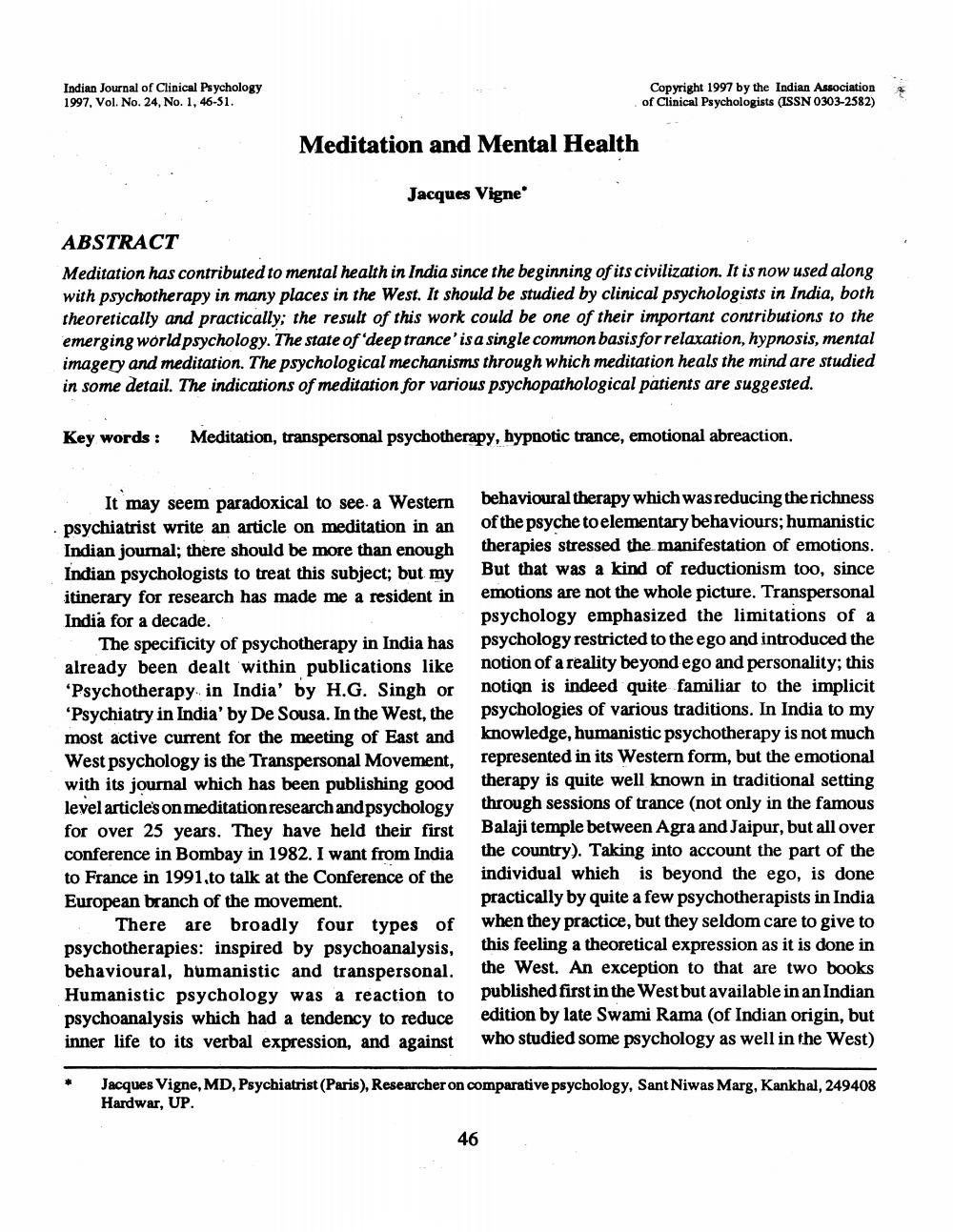________________
Indian Journal of Clinical Psychology 1997, Vol. No. 24, No. 1, 46-51.
Copyright 1997 by the Indian Association of Clinical Psychologists (ISSN 0303-2582)
Meditation and Mental Health
Jacques Vigne
ABSTRACT Meditation has contributed to mental health in India since the beginning of its civilization. It is now used along with psychotherapy in many places in the West. It should be studied by clinical psychologists in India, both theoretically and practically, the result of this work could be one of their important contributions to the emerging world psychology. The state of deep trance' is a single common basis for relaxation, hypnosis, mental imagery and meditation. The psychological mechanisms through which meditation heals the mind are studied in some detail. The indications of meditation for various psychopathological patients are suggested.
Key words:
Meditation, transpersonal psychotherapy, hypnotic trance, emotional abreaction.
It may seem paradoxical to see a Western psychiatrist write an article on meditation in an Indian journal; there should be more than enough Indian psychologists to treat this subject; but my itinerary for research has made me a resident in India for a decade.
The specificity of psychotherapy in India has already been dealt within publications like *Psychotherapy in India' by H.G. Singh or 'Psychiatry in India' by De Sousa. In the West, the most active current for the meeting of East and West psychology is the Transpersonal Movement, with its journal which has been publishing good level articles on meditation research and psychology for over 25 years. They have held their first conference in Bombay in 1982. I want from India to France in 1991 to talk at the Conference of the European branch of the movement.
There are broadly four types of psychotherapies: inspired by psychoanalysis, behavioural, humanistic and transpersonal. Humanistic psychology was a reaction to psychoanalysis which had a tendency to reduce inner life to its verbal expression, and against
behavioural therapy which was reducing the richness of the psyche to elementary behaviours; humanistic therapies stressed the manifestation of emotions. But that was a kind of reductionism too, since emotions are not the whole picture. Transpersonal psychology emphasized the limitations of a psychology restricted to the ego and introduced the notion of a reality beyond ego and personality; this notion is indeed quite familiar to the implicit psychologies of various traditions. In India to my knowledge, humanistic psychotherapy is not much represented in its Western form, but the emotional therapy is quite well known in traditional setting through sessions of trance (not only in the famous Balaji temple between Agra and Jaipur, but all over the country). Taking into account the part of the individual whieh is beyond the ego, is done practically by quite a few psychotherapists in India when they practice, but they seldom care to give to this feeling a theoretical expression as it is done in the West. An exception to that are two books published first in the West but available in an Indian edition by late Swami Rama (of Indian origin, but who studied some psychology as well in the West)
Jacques Vigne, MD, Psychiatrist (Paris), Researcher on comparative psychology, Sant Niwas Marg, Kankhal, 249408 Hardwar, UP.
46




